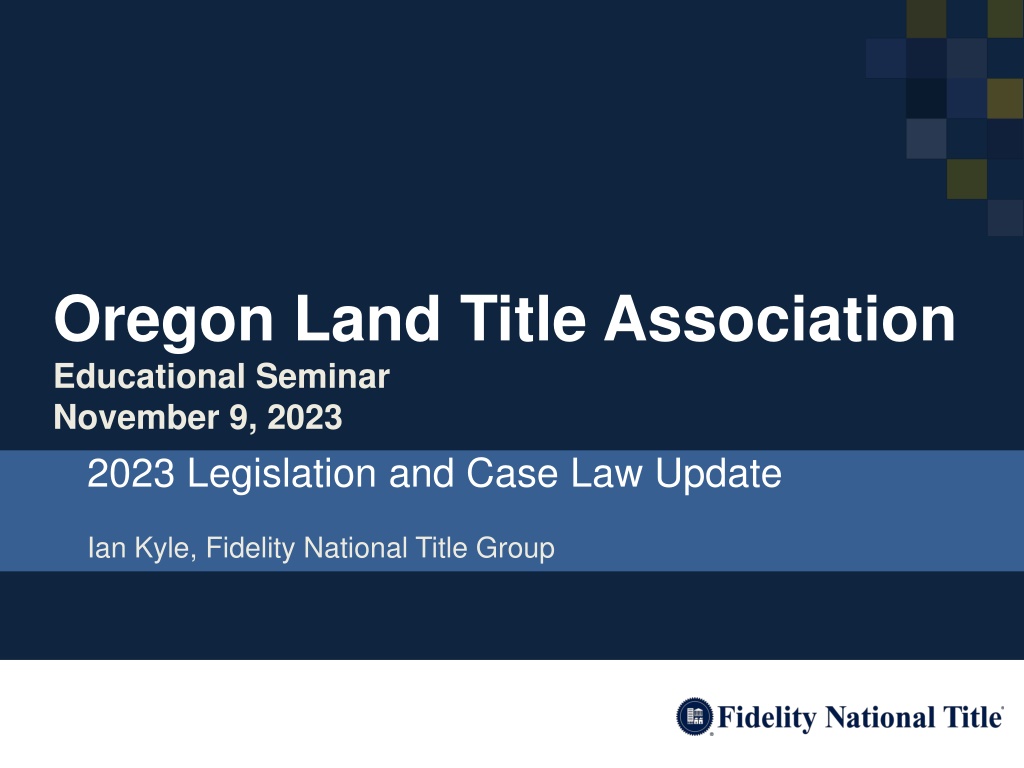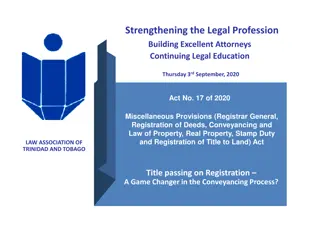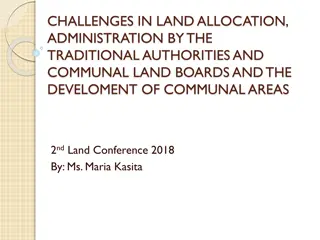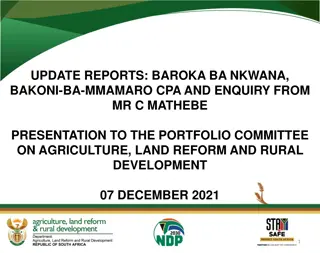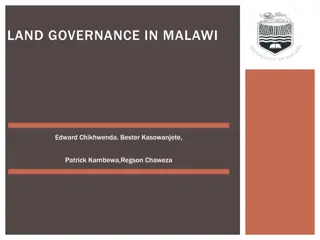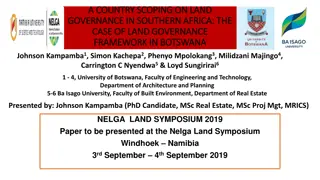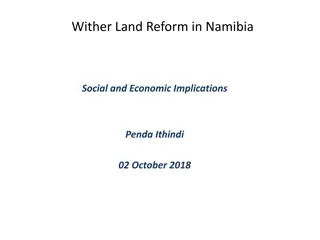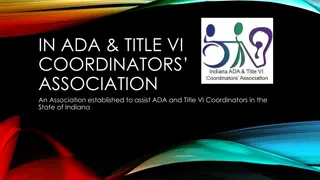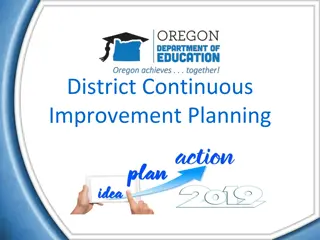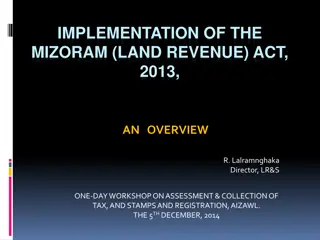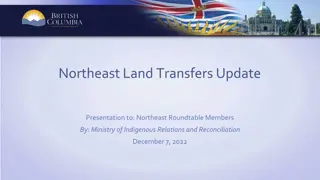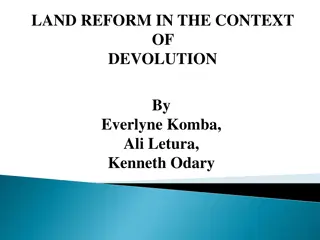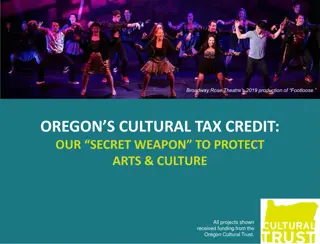Oregon Land Title Association
The seminar discusses a legal case involving the sale of land tracts in Oregon. It explores the concept of legal lots, risks to buyers, remedies against sellers, and details of the sale agreement. The case highlights the complexities and implications of land transactions in the state.
Download Presentation

Please find below an Image/Link to download the presentation.
The content on the website is provided AS IS for your information and personal use only. It may not be sold, licensed, or shared on other websites without obtaining consent from the author.If you encounter any issues during the download, it is possible that the publisher has removed the file from their server.
You are allowed to download the files provided on this website for personal or commercial use, subject to the condition that they are used lawfully. All files are the property of their respective owners.
The content on the website is provided AS IS for your information and personal use only. It may not be sold, licensed, or shared on other websites without obtaining consent from the author.
E N D
Presentation Transcript
Oregon Land Title Association Educational Seminar November 9, 2023 2023 Legislation and Case Law Update Ian Kyle, Fidelity National Title Group
Part I: Case law update.
Case #1: Freeborn v. Dow, 322 Or. App. 695 (2022) The deed is done, but is it a done deal?
Case #1: Freeborn v. Dow, 322 Or. App. 695 (2022) Facts In 2013 plaintiffs, Freeborns, sold two tracts of land to defendant, Dow. Tract A, a 5.65-acre residential homestead, and Tract B, a 119.8-acre pasture: However, Tracts A and B were not actually separate legal lots.
Case #1: Freeborn v. Dow, 322 Or. App. 695 (2022) Sidebar: What is a legal lot? ORS 92.010(3)(a) defines a lawfully established unit of land as one that is: (A) Created by subdivision, partition, or PLA under ORS Chapter 92 (enacted 1973), or (B) Created in compliance with all applicable planning, zoning, and subdivision or partition ordinances or regulations , or (C) By deed or land sales contract (if there were no such ordinances or regulations at the time of creation.) Finally, tax lot does not mean legal lot. ORS 92.010(3)(b). Risks to buyer: May not be able to obtain building permits or resell property without disclosure. Remedies against seller. Title insurance coverage in Oregon?
Case #1: Freeborn v. Dow, 322 Or. App. 695 (2022) Facts, cont. d A deal was struck: $400,000.00 total sale price Plaintiffs would convey both Tracts A and B to Defendant at closing. Plaintiffs would retain possession of the residential Tract, Tract A, while they pursued partition of Tracts A and B into separate legal lots at their expense. Defendant would convey title to Tract A back to Plaintiffs after the partition approved.
Case #1: Freeborn v. Dow, 322 Or. App. 695 (2022) Facts, cont. d Specifically, the sale agreement provided that Plaintiffs would pursue the partition and that: After the closing Purchaser shall be entitled to exclusive use and occupancy of the pasture parcel and Seller shall be entitled to the exclusive use and occupancy of the homestead parcel. Upon completion of the partition, Purchaser shall convey homestead [back to] Seller for no further consideration. Quoted in 322 Or. App. 695 at 698.
Case #1: Freeborn v. Dow, 322 Or. App. 695 (2022) Pause in the action: Deed #1: Freeborn to Dow Warranty Deed for Tracts A and B No reserved right to occupy homestead by Freeborn appeared on face of deed.
Case #1: Freeborn v. Dow, 322 Or. App. 695 (2022) Meanwhile, back at the ranch: Plaintiffs (Seller) pursued partition from 2013-2017 Never completed. It may have been impossible to complete, as we will see later. Boldly forging ahead anyway, Buyer Dow listed the pasture tract for sale in 2017 A third party, Jefferson Equities, then closed on both Tract A and Tract B in 2018 And served eviction notice on Freeborns to quit the homestead, prompting the litigation
Case #1: Freeborn v. Dow, 322 Or. App. 695 (2022) Deed #2: Dow to third-party buyer Jefferson Equities Warranty Deed for Tracts A and B No reservation of occupancy by Freeborns Two warranty deeds have recorded with no reference to the Freeborns right to occupy the homestead indefinitely until partition completed.
Case #1: Freeborn v. Dow, 322 Or. App. 695 (2022) Litigation Freeborn sued Dow, alleging breach of contract and elder abuse No quiet title claim mentioned Defendants moved for summary judgment, relying on merger rule, contending deed #1 superseded contract Merger rule: a deed pursuant to a contract extinguishes terms of the contract. The contract merges into the deed. Freeborns occupancy right would merge away, along with Dow s obligation to reconvey title. Trial court granted SJ in reliance on merger rule
Case #1: Freeborn v. Dow, 322 Or. App. 695 (2022) Appeal Court of Appeals reversed, agreeing with Freeborns that the merger rule did not apply. The deed does not necessarily extinguish promises in the antecedent contract that may be performed later (or that only can be performed later). Dow objected: but even promises as to title, and not just side promises? Yes, even those Court of Appeals remanded to determine question of fact: did Freeborns and Dow intend to merge the promise into the deed? Reminder that SJ is only granted when there is no genuine dispute of material fact
Case #1: Freeborn v. Dow, 322 Or. App. 695 (2022) Appeal, continued. Alternative argument by Defendants: By giving a warranty deed, with no exception for their reserved rights, Freeborns are estopped from arguing that they conveyed anything less than unencumbered fee title. ORS 93.850, effect of warranty deed, at sub (3): If the grantor desires to exclude any encumbrances or other interests from the scope of the covenants of the grantor, such exclusions must be expressly set forth on the deed. There were no such reservations on the deed. Argument rejected. Held: statute did not preempt merger case law.
Case #1: Freeborn v. Dow, 322 Or. App. 695 (2022) Discussion Seller Dow should have disclosed Freeborn s rights on title affidavit / title application when selling to 3rdparty. Possession by Freeborns! Did Deed #2 erroneously contain both Tracts, or necessarily contain both? Since A and B could not be sold separately. Did Jefferson Equities know of Freeborns occupancy? How could this have been structured successfully?
Case #1: Freeborn v. Dow, 322 Or. App. 695 (2022) Discussion Escrow Insist on title affidavit Ask who has possession of the property Review PSAs for reserved rights of seller (is this excessive?) Examiners / title A deed may not be the end of the story Does the legal description match the listing photos? Lessons for underwriting
Case #1: Freeborn v. Dow, 322 Or. App. 695 (2022) More to the story 1 Freeborns were weeks away from losing both tracts to foreclosure when they sold to Dow in 2013 Freeborns had granted a 2ndlien DOT on the homestead tract only to PNC Bank The third-party purchaser in 2018, Jefferson Equities, brought a suit to cancel the 2ndDOT in favor of PNC because it did not encumber a legal lot The applicable zoning required 80-acre minimum parcels, so if PNC were to foreclose on the homestead, an illegal lot would be created.
Case #1: Freeborn v. Dow, 322 Or. App. 695 (2022) More to the story 2 PNC did not contest the action and its trust deed was canceled. Since the zoning code required 80-acre parcels, was the partition of Tracts A and B simply impossible? Dow only had to convey homestead back to Freeborns upon partition. For the land use gurus to sort out.
Case #2a: Martucci v. Hilton, 326 Or. App. 87 (2023) (unpublished) Facts Neighbors entered into a letter agreement for an acre for acre exchange of property. Surveyed boundaries. Surveyor went out and painted trees blue to show one neighbor what he would be obtaining in swap.
Case #2a: Martucci v. Hilton, 326 Or. App. 87 (2023) (unpublished) Facts continued No deeds confirming the swap were recorded. Both parcels were later sold to separate buyers A dispute arose between the subsequent owners about the boundary line Plaintiffs tried to enforce the letter agreement (referenced in prior slide) as a boundary by agreement : a transfer of land exempt from the Statute of Frauds. Trial court rejected Plaintiff s argument
Case #2a: Martucci v. Hilton, 326 Or. App. 87 (2023) (unpublished) Court of Appeals: Plaintiff was not entitled to rely on boundary by agreement. Boundary by agreement requires uncertainty as to the location of the true boundary line. The parties must be marking an uncertain boundary rather than making a conveyance of land. A conveyance of land falls within the SoF. Boundary line agreements cannot be an end-run around the boundary line adjustment process
Case #2a: Martucci v. Hilton, 326 Or. App. 87 (2023) (unpublished) Discussion: Boundary line agreements v. boundary line adjustments The previous neighbors agreed to make a conveyance. Their intent could not alter the location of the true, ascertainable boundary line. Only an agreement to fix an unknown line is exempted from the statute of frauds. BL Agreements of record should show as exceptions to title and escalated to your underwriter. BL Agreements should be disclosed under ORS seller disclosures. Unlike other states Oregon does not have a BLAgreement statute. Common law only.
Case #2b: Ramos v. Potkowski, 322 Or. App. 686 (2022) When your neighbor Kramer does you a favor.
Case #2b: Ramos v. Potkowski, 322 Or. App. 686 (2022) Facts Neighbors owned adjoining lots in Marylhurst Heights Subdivision. Plaintiffs in red Defendant in light blue
Case #2b: Ramos v. Potkowski, 322 Or.App. 686 (2022) Facts Plaintiff s predecessor, Dyer, testified that when he bought in 1993, a neighbor, Kramer, showed him the East boundary of his property as follows: The dashed line.
Case #2b: Ramos v. Potkowski, 322 Or.App. 686 (2022) Facts Kramer appeared 22 years later in 2015 when defendants predecessor, Barnard, wanted to build a shed and chicken coop on his property, Lots 5, 6 and 14, and needed guidance about the boundaries. Kramer gestured to two stakes or two points. Dyer attended this meeting.
Case #2b: Ramos v. Potkowski, 322 Or.App. 686 (2022) Facts After that later meeting, Barnard believed his west line to run as follows:
Case #2b: Ramos v. Potkowski, 322 Or.App. 686 (2022) Facts Plaintiffs learned that Barnards improvements (shop, road, chicken coop and shed now owned by Defendants) encroached over their lot line when they sought to build an ADU on their property. Plaintiffs filed suit for trespass and ejectment of the coop, shed, etc. Defendants opposed on the theory that a boundary by agreement had been reached by the predecessor owners (Dyer and Barnard) under Kramer s guidance
Case #2b: Ramos v. Potkowski, 322 Or.App. 686 (2022) Law Elements of boundary by agreement (common law) 1. there must have been an initial dispute and mutual uncertainty about the true location of the boundary, 2. there must have been mutual resolution of the uncertainty or dispute by an express or implied agreement to permanently recognize a particular line as the boundary, and 3. there must be evidence of the agreement by subsequent activities, e.g., recording a written agreement or occupying the property up to the new boundary.
Case #2b: Ramos v. Potkowski, 322 Or.App. 686 (2022) Holding Here, again, as in case 2a, the parties mistaken beliefs about the location of the boundary line did not demonstrate genuine uncertainty as to the true location of the line. Additionally, they conveyed out using subdivision lot legal descriptions. Their conduct was inconsistent with their understanding and adopting of the alternative boundary lines.
Case #2b: Ramos v. Potkowski, 322 Or.App. 686 (2022) Discussion We are picky about encroachments over boundary lines. Caution if the lines of occupation do not match the boundary lines of record. Seeing more infill in Portland. Sellers (predecessors to the parties to suit) failed to disclose any boundary issues: D. Are there any encroachments, boundary agreements, boundary disputes or recent boundary changes? [ ]Yes [ ]No [ ]Unknown Recovered monuments (in this case by Kramer) might be offline
Case #2b: Ramos v. Potkowski, 322 Or.App. 686 (2022) Discussion KRAMER!
Case #3: Myers v. Owners of Record of that certain real property described as Lot 1, Tract C, Replat of Tract C Deer Park I, Deschutes County. Facts and posture Plaintiff owned property in Sunriver subject to servitudes restricting portions for use as athletic fields (with parking) and open space. Plaintiff wanted to open licensed residential care facility on lot. Plaintiff sued Sunriver Resort etc. to have restrictions removed under ORS 93.270.
Case #3: Myers v. Owners of Record of that certain real property described as Lot 1, Tract C, Replat of Tract C Deek Park I, Deschutes County. Applicable law ORS 93.270 allows removal of a covenant restricting use of real property: By any home or facility that is licensed under ORS 443.400 to 443.455 or 443.705 to 443.825 to provide residential care alone or in conjunction with treatment or training or a combination thereof. ORS 93.270(1)(B)(2). What is a residential care facility Residential care facility means a facility that provides residential care in one or more buildings on contiguous properties: (a)For six or more socially dependent individuals or individuals with physical disabilities or (b) [fewer individuals if needed]
Case #3: Myers v. Owners of Record of that certain real property described as Lot 1, Tract C, Replat of Tract C Deek Park I, Deschutes County. Trial court Granted plaintiff relief and removed the athletic field covenants / open space covenant Appellate court Not so fast. Does a provision in a deed that uniformly limits all or nearly all development of the property violate ORS 93.270(1)(b)(B)?
Case #3: Myers v. Owners of Record of that certain real property described as Lot 1, Tract C, Replat of Tract C Deek Park I, Deschutes County. Appellate court holding No. ORS 93.270(1)(b)(B) only prohibits provisions that impose restrictions about or concerning use by licensed residential facilities. Prohibits restrictions that: (1) expressly limit use of the property by a licensed residential facility; and (2) have the effect of preventing use of the property by a licensed residential facility, but not other residential uses. The statute does not prohibit general property restrictions, like the ones at issue or a conservation easement.
Case #3: Myers v. Owners of Record of that certain real property described as Lot 1, Tract C, Replat of Tract C Deek Park I, Deschutes County. Discussion ORS 93.270(1)(b)(B) only prohibits property restrictions that specifically prevent use for a licensed residential facility but not other residential uses. General restrictions that incidentally make it impossible to use a licensed residential facility (but also other uses) on the property do not violate the statute. Relevance: ORS 93.270(1)(a) also lists protected categories which may not be the subject of discriminatory covenants in Oregon, and was just overhauled to provide an easier way to remove them.
Part II: Legislative Update
House Bill 3294: Redaction of Discriminatory Covenants Background: ORS 93.270(1)(a) A person conveying or contracting to convey fee title to real property, or recording a declaration under ORS 94.580 may not include in an instrument for that purpose a provision: (a) Restricting the use of the real property by any person or group of persons by reason of race, color, religion, sex, sexual orientation, gender identity, national origin or disability. Additionally any such covenants are void ab initio. Two mechanisms to enforce removal: ORS 93.274 (protected categories discrimination) and ORS 93.272 (all others, such as residential care facility / child care facility restrictions) HB 3294 amends ORS 93.274
House Bill 3294: Redaction of Discriminatory Covenants Prior law (2018 Oregon Laws, Ch. 35, sec. 1) Petitioner had to mail notice of the proceeding to remove the covenant to all affected owners. Affected owners could request hearing on validity. Sole issue to decide was whether covenant violated ORS 93.270(1)(a). The court entered a judgment removing the covenant from the record.
House Bill 3294: Redaction of Discriminatory Covenants Prior law (2018 Oregon Laws, Ch. 35, sec. 1) Practical problems: Judgment declaring covenant void merely republishes offensive covenant. Priority date of original covenants still valid provisions preserved? Integrity of records. What if valid covenants get lost in the redaction process?
House Bill 3294: Redaction of Discriminatory Covenants 2023 Legislative Session background Lake Oswego legislator wanted law revised. Initial suggestion was to made county recorders responsible to review and redact discriminatory covenants. Other proposals (such as in California) have required title offices to perform this work. OLTA worked with County Counsel (recorders) to produce a workable solution.
House Bill 3294: Redaction of Discriminatory Covenants Updated law: Now an in rem action against all affected property Example: just one lot owner in a subdivision may remove covenant from all lots in subdivision Affected lot owners are not notified Petition sets out discriminatory covenant, but if the court agrees, the covenant is not republished in the county records. It says in the court case. (next slide)
House Bill 3294: Redaction of Discriminatory Covenants If the court finds that any provisions of the recorded instrument or declaration are void by reason of ORS 93.270 (1)(a), the court shall enter an order: (A) Finding that the referenced original written instrument or declaration contains discriminatory provisions that are void and unenforceable under ORS 93.270 (1)(a); (B) Identifying each document by recording number and date of recordation; and (C) Striking the void provisions from the public records and eliminating the void provisions from the title to the property described in the petition. The order must include a certified copy of each document upon which the court has physically redacted the void provisions. The order must provide that the effective date of the document redacted by the court is the same as the effective date of the original document.
House Bill 3294: Redaction of Discriminatory Covenants (4) A county clerk who receives a certified copy of an order and redacted document described in this section with the fees required under ORS 205.320 shall: (a) Record the order and the certified copy of the document upon which the court has physically redacted the void provisions; (b) Update the index of each original document referenced in the order with the recording number of the modified document; and (c) Maintain the original document or an image thereof separately from electronic public access and preserve the original document or image for historical or archival purposes.
House Bill 3294: Redaction of Discriminatory Covenants Effective date: Jan. 1, 2024 Any petitions filed under the prior (2018) law may be amended to conform with this 2023 revision prior to Jan. 2, 2026 Model petition forms will be produced for use by the public.
House Bill 2029: Increases minimum font size for recorded documents. Increases minimum font size from 8 point to 10 point for recorded documents. Applies to docs recorded after effective date. As before, does not apply to out of state notarial certs or certified copies of public records. We believe footnotes and endnotes will be exempted from minimum size requirements. Source: personal communication with clerks. Effective date: January 1, 2024.
House Bill 2029: Increases minimum font size for recorded documents. Testimony: Mr. Oregon supports the Bill, but bemoans that the increase isn t to even larger minimum font sizes. Practice tip: Scaling. High-definition screens make text appear smaller. Display Settings :
House Bill 2032: Expands eligibility for registered domestic partnerships Prior Law Oregon Family Fairness Act Effective Feb. 4, 2008, before same-sex marriage was available in Oregon (2014). Authorized Registered Domestic Partnerships (RDPs) only for same-sex couples. Registered: not merely informal or implicit New Law RDPs are now available regardless of sex of partners:
House Bill 2032: Expands eligibility for registered domestic partnerships May RDPs hold as tenants by the entireties / are they presumed to so hold? OFFA extends all of the privileges, rights and immunities of married spouses to RDPs. ORS 106.340(1) However, ORS 93.180(3) presumes that spouses married to each other take as TBEs, absent other vesting words such as tenants in common. Does not apply presumption to RDPs. RDPs are not spouses married to each other (or to any other person). See ORS 106.315(1)(a). There is a difference of opinion on whether a TBE is presumed when RDPs take title with no concurrent estate listed. Best practice is to be explicit and have them specify their concurrent estate when taking title. Effective Date: January 1, 2024
House Bill 2032: Expands eligibility for registered domestic partnerships RDPs are created by state law; but not recognized under federal law Testimony of PERS. Neutral. Retirement plans under federal law. Mr. Oregon gladly concurs in the bill.
